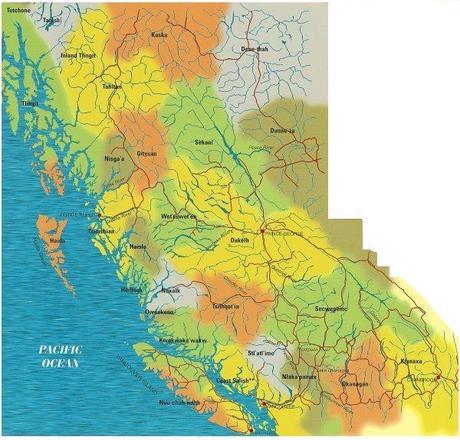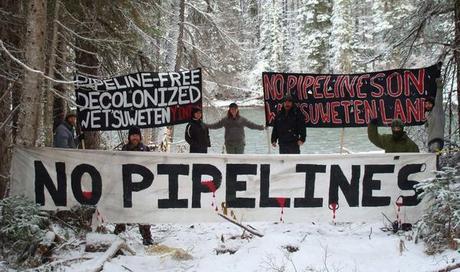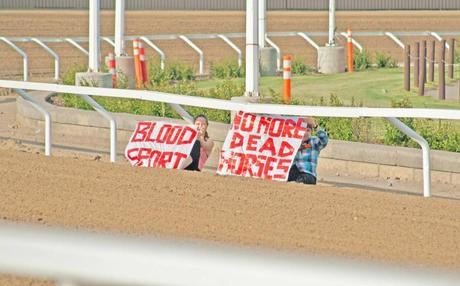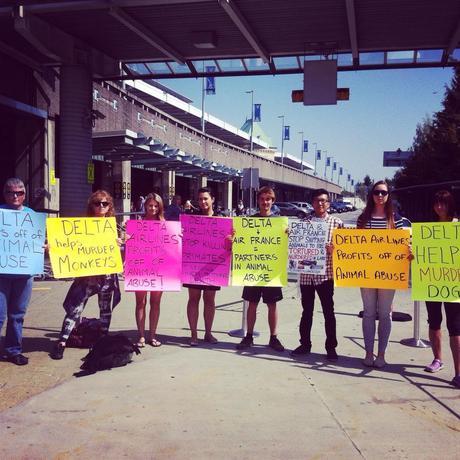
Colonially occupied territories now known as British Columbia
from Fight or Flight
When charting our tour route through the Pacific Northwest, we knew for sure that we wanted to visit so-called Vancouver on the occupied and unceded territories of the Coast Salish. This is an area ripe with resistance. The First Nations in so-called British Columbia have largely never ceded their territory or entered into treaty negotiations with the settler state. In fact, the city of Vancouver recently formally declared itself to be on unceded territories of the Musqueam, Squamish, and Tsleil-Waututh First Nations. These lands are home to extremely dynamic frontline communities of indigenous resistance.
At Oppenheimer Park in so-called Vancouver, indigenous protesters have started a permanent camp and issued an eviction to settlers after the city attempted to evict the homeless population living there. In the northern territories, the Unist’ot’en Camp, a resistance community dedicated to defending the Wet’suwet’en lands from pipeline development and tar sands infrastructure, has evicted TransCanada. The Neskonlith band has issued an eviction to Imperial Metals after the Mount Polley mine disaster in the territories of the Secwepemc First Nation. The Red Chris mine, also owned by Imperial Metals and nearly operational, is currently being blockaded by the Tahltan First Nation.
The Tahltan have also set up a blockade in opposition to settler moose hunting in their territory. Along the southern coast, the Central Coast First Nations Bear Working Group, a project of the Wuikinuxv, Heiltsuk, Kitasoo/Xai’xais, and Nuxalk Nations enacted a total ban on trophy hunting on their unceded and occupied territories. They have vowed to uphold it.

Pipeline resistance at the Unist’ot’en Camp
Settler movements in the territories are vibrant as well. Rising Tide Vancouver Coast Salish Territories is active in climate justice and solidarity work for the Unist’ot’en. Vancouver Animal Defense League has been running a very successful pressure campaigns against high-end fur retailers, Vancouver Aquarium, and the group recently blockaded the Calgary Stampede. These are the communities with whom we were intent on networking. We had a workshop scheduled at Spartacus Books and a day of protests that followed. We were excited.

Blockade of Calgary Stampede
We were wrong. When we drove up to the border guard booth, we were immediately asked to pull our vehicle to the side and go inside the Canadian Border Services Agency office for questioning. After three hours of questioning into our personal and activist backgrounds, we were denied entry supposedly based on prior criminal history that made us “inadmissible” due to security concerns under Canadian immigration and customs law. CBSA agents can use individual discretion when determining who is and who is not a security threat and when to deem someone “inadmissible.”
In our case, we were denied entry only after being questioned (to no avail) about our activity, histories, and our plans while in Vancouver. This whole process took about three hours. We then had to immediately head back over the US border at the Peace Arch Port of Entry and deal with US Customs and Border Protection, who detained us for an additional three hours. We sat in a cold, gray waiting room adorned in US flags wrapped with gold fringes while border patrol agents thoroughly searched our car and personal items. They were not forthcoming regarding why we were being detained, and when we asked why it took so long they responded, “one of you has a really common name so it took a long time to find you in the system.” As a point of clarification: none of us have common names.
We knew that attempting to cross the Canada-US border would not be easy. Since 9/11, the border has become increasingly more restrictive for migrants and asylum seekers, while simultaneously increasing the flow of free trade. Such racist, neoliberal polices are part of what No One Is Illegal organizer Harsha Walia calls border imperialism, and they are an extension of settler colonialism. The result is a border under heavy surveillance. It is notorious for harassment and detainment and has been used as a tool to chill activists attempting to cross. But given that we were only attempting to enter Canada for a workshop and simple protests, we expected nothing more than interrogation and possibly detention.
The whole experience highlighted not only the absurdity of surveillance and repression for activists, it highlighted the problem of borders and the colonial function they serve. When attempting entry into Canada, we were literally told by a border agent, “It is an honorable thing to cross an international border,” as if to tell us in reality, “You have no rights here.” The land we attempted to cross are the occupied and unceded territories of the Coast Salish peoples and do not belong to either the Canadian or US governments.
The border itself serves the purposes of maintaining racist, imperialist, occupying powers and policies. While in detention on both sides of the border, we were practically the only white settlers not in police uniform. We were some of the only people being detained that were not people of color. Constructing borders, both physical and relational, and frameworks of “legality” and “illegality” with respect to migration is a function of settler states. From our social positions it was a privilege to be attempting to cross at all, let alone for activist purposes, afforded to us through the colonial system.
This is why we wanted to come to the occupied territories of so-called Vancouver, BC. It is imperative that animal liberationists understand that the struggle for animals can directly be traced to colonial and capitalist roots. Solidarity with animals needs to extend to solidarity with communities and peoples that struggle under colonial occupation, ecological devastation, capitalist exploitation, and border imperialism. These are the fundamental barriers to animal liberation. Continued isolationism for our movement prevents us from seeing the connection. So while we were indeed denied entry, it strengthened our resolve to work in solidarity against the colonial-capitalist system and with the people and animals that suffer under it.

VADL protest
“On August 20th, the Fight or Flight tour crew was denied entry into unceded Coast Salish Territories (so-called Vancouver, BC) by the colonial state of Canada, and the proposed workshops were unfortunately cancelled. In solidarity with The Bunny Alliance’s ongoing campaign against Delta Air Lines and Air France, activists with the Vancouver Animal Defense League carried through with the planned protests at the Vancouver International Airport the following day.
Upon arrival at the airport, activists were met with at least a dozen cops, along with airport security and representatives, who were all expecting the protest. One of the cops told the protestors that they had heard about the crew who was detained and turned back at the border, and that the airport reps had corralled off a designated protest area. Not knowing where the designated area was, protestors entered the airport and headed towards Delta’s check-in booths, until airport reps and cops escorted them back out. For the next hour activists held signs at the protest area by the entrance, which had surprisingly high exposure to foot and car traffic. Quite a few passersby came up and took flyers, asked questions, and expressed support for the campaign.”In spite of these setbacks, Vancouver Animal Defense League still held a demonstration in solidarity:

